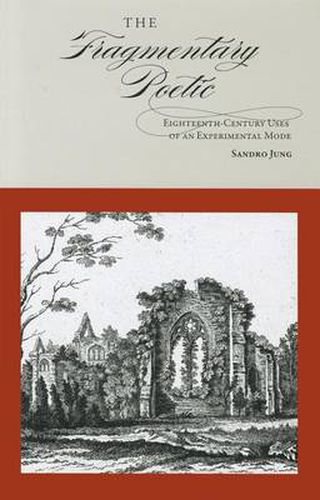Readings Newsletter
Become a Readings Member to make your shopping experience even easier.
Sign in or sign up for free!
You’re not far away from qualifying for FREE standard shipping within Australia
You’ve qualified for FREE standard shipping within Australia
The cart is loading…






The Fragmentary Poetic: Eighteenth-Century Uses of an Experimental Mode is the first study of the mode of the fragmentary in eighteenth-century poetry. Revisiting traditional literary historiography, it offers a fresh account of the Pindaric impulse, a mode informing deliberate fragmentation. It distinguishes itself from the work of Thomas McFarland, Marjorie Levinson (on the Romantic fragment poem), and Elizabeth Wanning Harries (on the prose fragment in the late eighteenth century) through its familiarity with the varied poetic landscape of the period. Through its immersion in the (still) under-researched field of eighteenth-century poetry and its inclusive, historicist approach, it introduces original but rarely discussed poems, thereby contributing to the mapping, and better understanding, of the growing canon of poetry.
Rather than being overtly contrasted with the preceptive poetics of early eighteenth-century Neoclassicism, the fragmentary impulse is read as integral to new genres such as the long-poem and the Pindaric ode. Its amphibian nature accommodates its transgeneric use in genres as varied as the ode and the epic, deploying the ruin as an emblem of its deliberate resistance to closure or the sublime to indicate rupture. The study discusses the ode, the long-poem, imitations of Spenser, Macpherson’s reinventions of the epic, and poems engaging with (personal and cultural) memory and ruin. It further explores intermodal cooperation in productions ranging from satire to the epic.
Poets variously utilized the fragmentary as a mode reflecting human fallenness and the fragmentedness of human existence, but also (paradoxically) as evidence for original completeness and authenticity. In addition, the ruin as a cultural construct facilitated the recognition of the fragmentary as a valid mode. Detailed discussions of poems include works by authors ranging from James Thomson and Edward Young to James Macpherson, Charlotte Smith, and Wordsworth. Scholars of both eighteenth-century and Romantic period poetry will find The Fragmentary Poetic a useful guide to the generic complexity that characterizes the poetry of the eighteenth century. This account of the polymorphous nature of the fragment and its definitional and formal fluidity enables scholars to rethink eighteenth-century form and to appreciate a pervasive mode that found its most varying expression in the poetry of the period.
$9.00 standard shipping within Australia
FREE standard shipping within Australia for orders over $100.00
Express & International shipping calculated at checkout
The Fragmentary Poetic: Eighteenth-Century Uses of an Experimental Mode is the first study of the mode of the fragmentary in eighteenth-century poetry. Revisiting traditional literary historiography, it offers a fresh account of the Pindaric impulse, a mode informing deliberate fragmentation. It distinguishes itself from the work of Thomas McFarland, Marjorie Levinson (on the Romantic fragment poem), and Elizabeth Wanning Harries (on the prose fragment in the late eighteenth century) through its familiarity with the varied poetic landscape of the period. Through its immersion in the (still) under-researched field of eighteenth-century poetry and its inclusive, historicist approach, it introduces original but rarely discussed poems, thereby contributing to the mapping, and better understanding, of the growing canon of poetry.
Rather than being overtly contrasted with the preceptive poetics of early eighteenth-century Neoclassicism, the fragmentary impulse is read as integral to new genres such as the long-poem and the Pindaric ode. Its amphibian nature accommodates its transgeneric use in genres as varied as the ode and the epic, deploying the ruin as an emblem of its deliberate resistance to closure or the sublime to indicate rupture. The study discusses the ode, the long-poem, imitations of Spenser, Macpherson’s reinventions of the epic, and poems engaging with (personal and cultural) memory and ruin. It further explores intermodal cooperation in productions ranging from satire to the epic.
Poets variously utilized the fragmentary as a mode reflecting human fallenness and the fragmentedness of human existence, but also (paradoxically) as evidence for original completeness and authenticity. In addition, the ruin as a cultural construct facilitated the recognition of the fragmentary as a valid mode. Detailed discussions of poems include works by authors ranging from James Thomson and Edward Young to James Macpherson, Charlotte Smith, and Wordsworth. Scholars of both eighteenth-century and Romantic period poetry will find The Fragmentary Poetic a useful guide to the generic complexity that characterizes the poetry of the eighteenth century. This account of the polymorphous nature of the fragment and its definitional and formal fluidity enables scholars to rethink eighteenth-century form and to appreciate a pervasive mode that found its most varying expression in the poetry of the period.